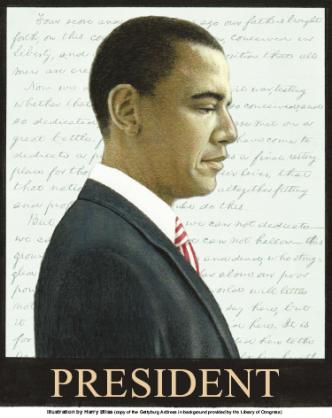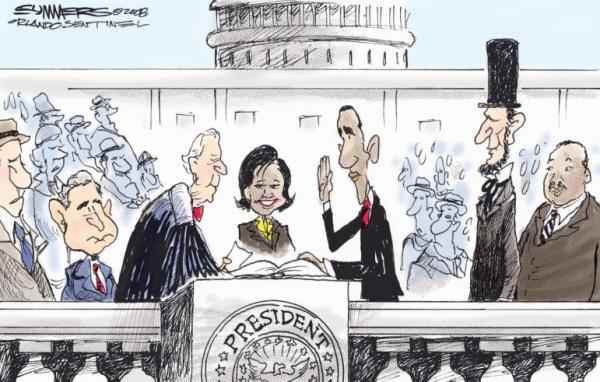- MENU
- HOME
- SEARCH
- WORLD
- MAIN
- AFRICA
- ASIA
- BALKANS
- EUROPE
- LATIN AMERICA
- MIDDLE EAST
- United Kingdom
- United States
- Argentina
- Australia
- Austria
- Benelux
- Brazil
- Canada
- China
- France
- Germany
- Greece
- Hungary
- India
- Indonesia
- Ireland
- Israel
- Italy
- Japan
- Korea
- Mexico
- New Zealand
- Pakistan
- Philippines
- Poland
- Russia
- South Africa
- Spain
- Taiwan
- Turkey
- USA
- BUSINESS
- WEALTH
- STOCKS
- TECH
- HEALTH
- LIFESTYLE
- ENTERTAINMENT
- SPORTS
- RSS
- iHaveNet.com
Great Expectations
by Cal Thomas

In the run up to the presidential debates, handlers always try to lower expectations so that afterward they can claim their candidate did "better than expected."
With Barack Obama, it is the reverse. Perhaps because of his eloquence, lithe body, handsome face and beautiful family (and because he is not George W. Bush), expectations are so high that they are beyond the reach of any mortal.
Perhaps that is why Obama has been disparagingly referred to as "the messiah" and "the one."
Part of this projection has to do with the need of many politicians to lead people into placing more faith than they should in government.
This is understandable to a point in that the more faith people have in politicians and government, the more they will need politicians and government. This helps keep politicians in office.
The media help "evangelize" the masses to place their faith in government because it increases their own sense of power and value. While government is often better able to commit "sins," economic or otherwise, than to deliver us from our individual and collective shortcomings and circumstances, the faith some have in government approaches cult-like status.
President-elect Obama is a blank slate upon which his supporters are writing their own beliefs and hopes. In a post-election discussion on PBS with Charlie Rose, Tom Brokaw and Newsweek editor Jon Meacham, there was consensus that no one fully knows what Obama believes, what books he reads (other than "Team of Rivals"), what his policy toward China or Venezuela will be and where he wants to take the country.
The major media did a poor job probing Obama's depths beyond sound-bite answers and feel-good responses. "In the tank" was a frequent and in my view accurate description of the big media's failure to properly do its job. Smaller media aka cable news didn't do much better, focusing on selected rants by Rev. Jeremiah Wright and the '60s radical, William Ayers. Substance is hard to find on TV, making it essential that print journalists live up to what once were higher standards and probe the depths of anyone running for president.
For African-Americans, Obama represents a hope and a possible nightmare.

Though he is half-white, African-Americans (after some initial reluctance brought on by their fealty for Hillary and Bill Clinton) enthusiastically embraced him. Consider the election night reaction from Harvard's Henry Louis Gates Jr., writing on the Web page theroot.com: "Nothing could have prepared any of us for the eruption (and, yes, that is the word) of spontaneous celebration that manifested itself in black homes, gathering places and the streets of our communities when Sen. Barack Obama was declared President-elect Obama. From Harlem to Harvard, from Maine to Hawaii and even Alaska from "the prodigious hilltops of New Hampshire … [to] Stone Mountain of Georgia," as Dr. King put it, each of us will always remember this moment, as will our children, whom we woke up to watch history being made.
"My colleagues and I laughed and shouted, whooped and hollered, hugged each other and cried. My father waited 95 years to see this day happen, and when he called as results came in, I silently thanked God for allowing him to live long enough to cast his vote for the first black man to become president. And even he still can't quite believe it!"
After the celebrating, which will conclude at the Inauguration, comes the reality.
Can Obama be more than a historical "first"? Can he give back to African-Americans what they once had, but have no more and most need: intact families with mothers and fathers rearing children and fewer single teenage mothers? Can he change the thinking of some African-American young people that excelling in school is not "acting white," but rather acting right? Can he replace despair with that hope he and his supporters talked about?
If he can lead them out of poverty, hopelessness, failure, prison, joblessness, welfare, single motherhood and the rest of the litany of despair that has disproportionately infected much of the African-American community, he will be their Moses and his greatness will be celebrated for generations to come. And if he fails? What will that do to race relations and the country's willingness to elect another black person president? The consequences of a failed Obama presidency would be disastrous on several levels.
That's a lot to project on America's first African-American president, but he asked for it.
Even conservatives who voted for John McCain should wish him nothing but success in such a cause, should he choose to undertake it.
WORLD | AFRICA | ASIA | EUROPE | LATIN AMERICA | MIDDLE EAST | UNITED STATES | ECONOMICS | EDUCATION | ENVIRONMENT | FOREIGN POLICY | POLITICS
© Tribune Media Services